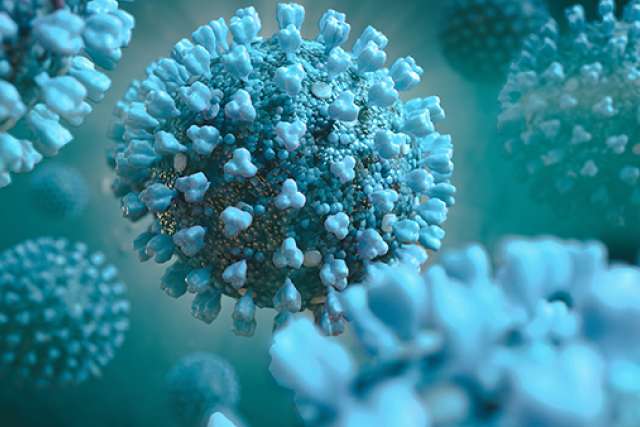FINDINGS
A new study led by Chinese researchers in collaboration with UCLA's Dr. Yibin Wang, PhD, has shown that people hospitalized with COVID-19 who took statin drugs were less likely to die and less likely to need mechanical ventilation than those who did not take the cholesterol-lowering drugs. Hospitalized patients taking statins had a 5.2% mortality rate, compared to a 9.4% mortality rate in patients not taking statins from two groups of COVID-19 patients with matching clinic characteristics except statin usage. Statin use also was linked to lower levels of inflammation, and a lower incidence of acute respiratory distress syndrome and admission to intensive care units.
Wang, professor in the Division of Molecular Medicine in the Departments of Anesthesiology, Medicine and Physiology, David Geffen School of Medicine at UCLA, says this is the first time a link has been observed between statin use and COVID-19 mortality based on a large-scale retrospective group analysis.
The study also found that patients taking statins showed a comparably lower risk of dying or suffering other negative outcomes whether or not they were taking blood pressure-lowering drugs called angiotensin-converting enzyme (ACE) inhibitors and angiotensin II receptor blockers (ARBs).
BACKGROUND
The COVID-19 pandemic has profoundly affected the lives of millions of people. To date, there is no vaccine or specific drug to prevent or treat severe acute respiratory syndrome coronavirus 2 (SARS-CoV-2) infection, which causes COVID-19. Because the development of effective vaccines could take months, if not years, repurposing existing approved drugs is considered a more attractive strategy.
Statins are cholesterol-lowering drugs with a very good safety profile, low cost and potent anti-inflammatory effects, which suggest they could be beneficial to counter SARS-CoV-2 infection. In the clinic, they are often prescribed along with ACE inhibitors and ARBs for individuals with hypertension (high blood pressure) or cardiac pathologies.
Earlier this year, the same group of researchers reported that people with COVID-19 taking ACE inhibitors and ARBs were at a lower risk of mortality than those not treated. Despite this, there were some concerns about the benefits of these drugs in COVID-19 patients because animal studies had shown that statins, ACE inhibitors and ARBs increase the expression of angiotensin-converting enzyme II (ACE2), the receptor that SARS-CoV-2 uses to infect host cells. Thus, a closer look was needed to determine how clinical outcomes in patients with COVID-19 could be affected by the use of statins, either alone or in combination therapy.
METHOD
The researchers looked back at the records of 13,981 COVID-19 patients admitted to 21 hospitals in the Hubei Province, China. Of those patients, 1,219 were given statins for an average of 25 days during hospitalization. Among patients with hypertension, 319 used statins combined with ACE inhibitors or ARBs, and 603 used statins combined with other antihypertensive drugs. Researchers analyzed mortality rates as well as secondary outcomes, including the need for mechanical ventilation, admission to intensive care units and acute respiratory distress syndrome. They also measured the levels of three inflammation biomarkers – circulating C reactive protein, interleukin 6 and neutrophil counts – selected to represent the overall status of systemic inflammation in the body.
Because participants that received statins were older and had a greater incidence of medical conditions such as hypertension, lung lesions and diabetes, the researchers analyzed patients that were matched for baseline characteristics such as age, disease severity and pre-existing conditions.
IMPACT
The results of the study, Wang says, support the potential benefits of statin use in hospitalized patients with COVID-19 and show the safety of proceeding with future studies involving statins for the treatment of COVID-19.
What this study does not show is that the decrease in the death rate of patients with COVID-19 is directly caused by the use of statins. Also, it is unclear whether the findings apply to non-hospitalized patients with COVID-19. A future randomized clinical trial is justified and necessary, Wang says, to determine whether statins confer protection against COVID-19-associated mortality in the general population.
AUTHORS
Dr. Yibin Wang from UCLA is a co-corresponding author in this study led by Dr. Hongliang Li from Wuhan University, China. Other authors include Xiao-Jing Zhang, Juan-Juan Qin, Xu Cheng, Lijun Shen, Yan-Ci Zhao, Yufeng Yuan, Fang Lei, Ming-Ming Chen, Huilin Yang, Liangjie Bai, Xiaohui Song, Lijin Lin, Meng Xia, Feng Zhou, Jianghua Zhou, Zhi-Gang She, Lihua Zhu, Xinliang Ma, Qingbo Xu, Ping Ye, Guohua Chen, Liming Liu, Weiming Mao, Youqin Yan, Bing Xiao, Zhigang Lu, Gang Peng, Minyu Liu, Jun Yang, Luyu Yang, Changjiang Zhang, Haofeng Lu, Xigang Xia, Daihong Wang, Xiaofeng Liao, Xiang Wei, Bing-Hong Zhang, Xin Zhang, Juan Yang, Guang-Nian Zhao, Peng Zhang, Peter P. Liu, Loomba Rohit, Yan-Xiao Ji, Jiahong Xia, Jingjing Cai, Jiao Guo and Hongliang Li.
JOURNAL
The research is published in Cell Metabolism, a journal published by Cell Press.



